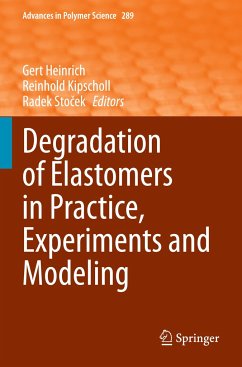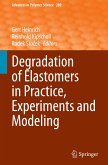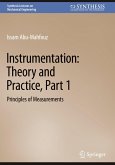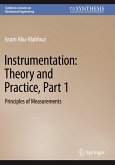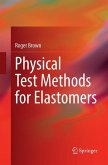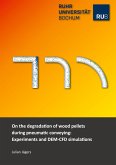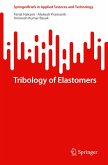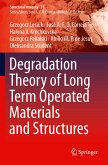Degradation of Elastomers in Practice, Experiments and Modeling
Herausgegeben:Heinrich, Gert; Kipscholl, Reinhold; Stocek, Radek
Degradation of Elastomers in Practice, Experiments and Modeling
Herausgegeben:Heinrich, Gert; Kipscholl, Reinhold; Stocek, Radek
- Broschiertes Buch
- Merkliste
- Auf die Merkliste
- Bewerten Bewerten
- Teilen
- Produkt teilen
- Produkterinnerung
- Produkterinnerung
This volume describes new insights into the main aspects of rubber degradation by material's fatigue, wear and aging evolution, as well as their impact on mechanical rubber properties. It provides a thorough state-of-art explanation of the essential chemical, physical and mechanical principles as well as practices of material characterization for wear prediction, and to convey or define novel strategies and procedures of planning effective wear test programs. The initiating factors of abrasion, the development of surface abrasion on sharp and blunt tracks (so called cutting and chipping) and…mehr
Andere Kunden interessierten sich auch für
![Degradation of Elastomers in Practice, Experiments and Modeling Degradation of Elastomers in Practice, Experiments and Modeling]() Degradation of Elastomers in Practice, Experiments and Modeling154,99 €
Degradation of Elastomers in Practice, Experiments and Modeling154,99 €![Instrumentation: Theory and Practice, Part 1 Instrumentation: Theory and Practice, Part 1]() Issam Abu-MahfouzInstrumentation: Theory and Practice, Part 159,99 €
Issam Abu-MahfouzInstrumentation: Theory and Practice, Part 159,99 €![Instrumentation: Theory and Practice, Part 1 Instrumentation: Theory and Practice, Part 1]() Issam Abu-MahfouzInstrumentation: Theory and Practice, Part 144,99 €
Issam Abu-MahfouzInstrumentation: Theory and Practice, Part 144,99 €![Physical Test Methods for Elastomers Physical Test Methods for Elastomers]() Roger BrownPhysical Test Methods for Elastomers132,99 €
Roger BrownPhysical Test Methods for Elastomers132,99 €![On the degradation of wood pellets during pneumatic conveying: Experiments and DEM-CFD simulations On the degradation of wood pellets during pneumatic conveying: Experiments and DEM-CFD simulations]() Julian JägersOn the degradation of wood pellets during pneumatic conveying: Experiments and DEM-CFD simulations77,88 €
Julian JägersOn the degradation of wood pellets during pneumatic conveying: Experiments and DEM-CFD simulations77,88 €![Tribology of Elastomers Tribology of Elastomers]() Ferial HakamiTribology of Elastomers37,99 €
Ferial HakamiTribology of Elastomers37,99 €![Degradation Theory of Long Term Operated Materials and Structures Degradation Theory of Long Term Operated Materials and Structures]() Grzegorz LesiukDegradation Theory of Long Term Operated Materials and Structures95,99 €
Grzegorz LesiukDegradation Theory of Long Term Operated Materials and Structures95,99 €-
-
-
This volume describes new insights into the main aspects of rubber degradation by material's fatigue, wear and aging evolution, as well as their impact on mechanical rubber properties. It provides a thorough state-of-art explanation of the essential chemical, physical and mechanical principles as well as practices of material characterization for wear prediction, and to convey or define novel strategies and procedures of planning effective wear test programs. The initiating factors of abrasion, the development of surface abrasion on sharp and blunt tracks (so called cutting and chipping) and the influence of smear and lubricants is also summarized. The volume is of interest to research scientists in related fields from academia and industry.
Produktdetails
- Produktdetails
- Advances in Polymer Science 289
- Verlag: Springer / Springer International Publishing / Springer, Berlin
- Artikelnr. des Verlages: 978-3-031-15166-8
- 1st ed. 2023
- Seitenzahl: 356
- Erscheinungstermin: 15. Oktober 2023
- Englisch
- Abmessung: 235mm x 155mm x 20mm
- Gewicht: 540g
- ISBN-13: 9783031151668
- ISBN-10: 3031151666
- Artikelnr.: 69000061
- Advances in Polymer Science 289
- Verlag: Springer / Springer International Publishing / Springer, Berlin
- Artikelnr. des Verlages: 978-3-031-15166-8
- 1st ed. 2023
- Seitenzahl: 356
- Erscheinungstermin: 15. Oktober 2023
- Englisch
- Abmessung: 235mm x 155mm x 20mm
- Gewicht: 540g
- ISBN-13: 9783031151668
- ISBN-10: 3031151666
- Artikelnr.: 69000061
Gert Heinrich graduated at the University in Jena (G) in quantum physics in 1973. At the University of Technology (TH) Leuna-Merseburg, he finished his doctorate in 1978 in polymer network physics and his Habilitation in 1986 about theory of polymer networks and topological constraints. In 1990 he received a position at the tire manufacturer Continental in Hanover (G) as senior research scientist and head of Materials Research. Heinrich continued his academic activities as lecturer at Universities of Hanover (G) and Halle/Wittenberg (G). In 2002, he was appointed as a full professor for "Polymer Materials and Rubber Technology" at the Technische Universität Dresden and as director of the Institute of Polymer Materials at the Leibniz Institute of Polymer Research Dresden e. V. (IPF). Since 2017 he is a Senior Professor. His work has been recognized by several grants and awards, e.g. the George Stafford Whitby Award for distinguished teaching and research from the Rubber Division ofthe ACS, the Colwyn Medal in UK for outstanding services to the rubber industry; the Carl Dietrich Harries Medal from the German Rubber Society, and the Lifetime Achievement Award from Tire Technology International Magazine. Reinhold Kipscholl graduated as Dipl.-Ing. in engineering of data processing and electronics. He is active since more than 20 years in leading industrial positions, especially in the field of testing and characterization of materials with respect of their physical behavior. Since 20 years he is General Manager of Coesfeld GmbH & Co. KG (Dortmund), a German Company developing and producing material testing equipment for plastics and elastomers. In 2012, R. Kipscholl founded and became CEO of PRL Polymer Research Lab., a Czech company which he led until 2021, researching and developing new testing methods for characterization of fracture and wear behavior of rubbers. He has been awarded with the 2018 Fernley H. Bunbury Award (RubberDivision, American Chemical Society). Radek Stöek obtained his diploma degree as engineer in 2005 from the Czech Technical University in Prague and received his Ph.D. in engineering science in 2012 from the Technical University Chemnitz (Germany), working with M. Gehde and parallel with G. Heinrich at IPF Dresden (G). Then he started an industrial career at PRL Polymer Research Lab (PRL), Zlin, Czech Republic, and parallel an independent academic career at the Tomas Bata University (TBU) in Zlin. He finished his Habilitation in 2019. Currently he is holding the two positions as Managing Director at PRL and Head of the Rubber Department at TBU. His research and scientific interests are focused on characterization of rubber material properties with respect to fatigue and fracture mechanics and on the development of new and advanced testing methodologies, hardware and equipments. One main goal is to optimize industrial rubber products in terms of performanceand durability as well as to fasten development cycles and minimizing extensive real rubber product tests before production. His work has been recognized by awards from The Tire Society (USA). R. Stöek is author of 54 publications (according to Scopus) and holds several Utility Models.
Basic Mechanisms and Predictive Testing of Tire-Road Abrasion.- Thermo-Oxidative Aging and Mechanical Fatigue of Elastomer Compounds Used in Various Fields of Rubber Industry.- Novel Approach on Analyzing Mechanochemical Wear Mechanism of Rubber Vulcanizates in Molecular Scale.- Tire-Abrasion Particles in the Environment.- Multiphysical Modeling and Simulation of Thermal Damage of Elastomers: State of the Art and Developments Towards Cyber-Physical Systems.- Experimental and Numerical Description of the Heat Build-Up in Rubber Under Cyclic Loading.- The Effect of Thermal Ageing on the Fatigue Resistance of Hydrogenated Acrylonitrile Butadiene Rubber (HNBR) Compounds.- Effect of Antioxidants on the Aging Behavior of NR and S-SBR Materials.- Degradation of Tires During Intended Usage.- Thermal and Thermo-Oxidative Degradation of Rubbers: Some Recent Studies.- Experimental Analysis of Fast Crack Growth in Elastomers.- The Effect of Apparent Cross-Link Density on Cut and Chip Wear in Natural Rubber.- Parameters Influencing Fatigue Characteristics of Tyre Tread Rubber Compounds.- Mechanistic and Kinetic Studies on Degradation Processes of Rubber Types.
Basic Mechanisms and Predictive Testing of Tire-Road Abrasion.- Thermo-Oxidative Aging and Mechanical Fatigue of Elastomer Compounds Used in Various Fields of Rubber Industry.- Novel Approach on Analyzing Mechanochemical Wear Mechanism of Rubber Vulcanizates in Molecular Scale.- Tire-Abrasion Particles in the Environment.- Multiphysical Modeling and Simulation of Thermal Damage of Elastomers: State of the Art and Developments Towards Cyber-Physical Systems.- Experimental and Numerical Description of the Heat Build-Up in Rubber Under Cyclic Loading.- The Effect of Thermal Ageing on the Fatigue Resistance of Hydrogenated Acrylonitrile Butadiene Rubber (HNBR) Compounds.- Effect of Antioxidants on the Aging Behavior of NR and S-SBR Materials.- Degradation of Tires During Intended Usage.- Thermal and Thermo-Oxidative Degradation of Rubbers: Some Recent Studies.- Experimental Analysis of Fast Crack Growth in Elastomers.- The Effect of Apparent Cross-Link Density on Cut and Chip Wear in Natural Rubber.- Parameters Influencing Fatigue Characteristics of Tyre Tread Rubber Compounds.- Mechanistic and Kinetic Studies on Degradation Processes of Rubber Types.

